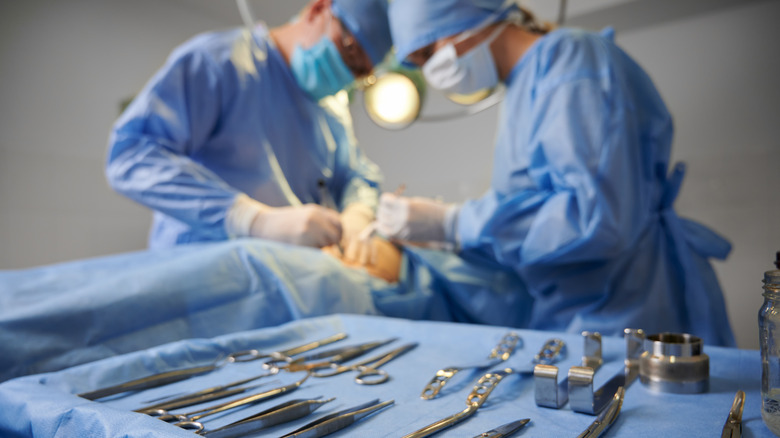Everything You Need To Know About Thyroid Eye Disease Surgery
The thyroid is a butterfly-shaped gland located in the front of the neck. It produces hormones that help regulate metabolism. When the thyroid gland is overactive or underactive, it can lead to thyroid eye disease (via Healthline). Thyroid eye disease (TED) occurs when the muscles and fatty tissues around the eyes become inflamed. This can cause the eyes to bulge outwards (proptosis), and the eyelids may become red and swollen. In cases where TED affects the structure or function of the eyes, surgery may be necessary to fix the problem.
There are three different types of thyroid eye disease surgery: orbital decompression, strabismus (eye muscle) surgery, and eyelid surgery. Orbital decompression is the most common type of surgery for thyroid eye disease. It involves removing bone and sometimes fatty tissue from around the eye to create more space for the eye to move. Strabismus surgery is done to correct crossed eyes. This type of surgery involves realigning the muscles that control eye movement. Eyelid surgery is done to improve vision by correcting droopy eyelids and involves lifting the eyelid to its normal position. Your doctor will help you figure out which type of surgery is best for you if you need a procedure.
What is thyroid eye disease?
Thyroid eye disease (TED) is an autoimmune condition that affects the eyes. It occurs when the immune system attacks the cells around the eyes, causing inflammation and swelling (via Cleveland Clinic). TED can also cause the muscles and tissues around the eyes to become damaged. The exact cause of TED is unknown, but it is thought to be related to a problem with the immune system. TED is more common in people with other autoimmune conditions, such as Graves' disease or Hashimoto's disease. There are also some genetic factors that may increase your risk of developing TED.
There is no cure for TED, but there are treatments that can help improve your symptoms. Treatment options include steroids, surgery, and radiation therapy. Some people may also need to wear an eye patch or have glasses prescribed to help with vision problems. TED can be a serious condition, so it's important to talk to your doctor if you think you may have it. Early diagnosis and treatment is the best way to prevent TED from causing permanent damage to your eyes.


